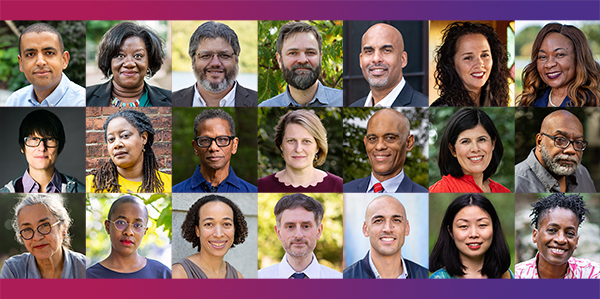Marlies Carruth, Director of the MacArthur Fellows Program, reflects on Fellows pursuing diverse endeavors working together to inspire creativity and new ways of thinking.
For nearly 40 years, MacArthur has awarded a five-year Fellowship to individuals who demonstrate extraordinary creativity or transformative work. This award, known as the MacArthur Fellowship, includes a no-strings-attached $625,000 grant. One distinguishing feature of the MacArthur Fellows Program is the breadth of endeavors represented within each class of Fellows—routinely spanning scientists, scholars, artists, and community visionaries.
We have learned from surveys and through individual feedback that many Fellows find this cohort diversity both humbling and inspiring, and they yearn for opportunities to connect with one another across fields. Alumni gatherings have always been a component of the Fellows Program though we lack the staffing capacity to organize both large and small gatherings every year. And while the digital revolution has made the ability to connect with one another possible with a few clicks, in practice we see communication silos among our Fellows, largely determined by profession.
Enter MacArthur’s expedited grant (X-Grant) program. The Foundation established the X-Grant program to improve our ability to make small, strategic grants with greater speed and efficiency. In 2017, the Fellows Program began offering X-Grants to qualifying organizations to support public-facing programming that involves two or more Fellows from different fields of endeavor.
This programming—including panels, performances, and conversations—allows Fellows to share new ideas and identify fresh inspiration for addressing real world problems. In the past three years, we have contributed support to nearly two dozen events on topics such as the supply and demand of care work, financial and legal resources for immigrants, and explorations into the parallels of artistic and scientific practices.
Recent events include a series of conversations on research frameworks, each involving a humanist, a scientist, and an artist at Bard Graduate Center in New York City. And in Eugene, Oregon, a musical performance centered on human rights with flutist Claire Chase, pianist Reginald Robinson, and activist Susan Sygall. Following an exhibition and talk between paleontologist Christopher Beard and sculptor Elizabeth Turk, the University of Kansas created a video, The MacArthur Dialogue, to document the event, and now most events are recorded, or otherwise documented, for the benefit of future reference.
What is exciting about this initiative is that it allows Fellows, in conjunction with a nonprofit host, to curate their own events while simultaneously exposing the public to the Fellows’ work. This year we are relaxing some of our programming restrictions that require field diversity. We are considering proposals that include combinations of Fellows who work on common causes, such as climate change or criminal justice reform, or Fellows who wish to focus on mentoring opportunities or field building projects. By supporting local events across the country, the creative work of our Fellows reaches new audiences, fosters generative interactions among Fellows, and strengthens connections between Fellows and community organizations.
Convening scientists, artists, scholars, and individuals involved in significant and timely issues of the day to engage in public discourse at museums, libraries, and other open forums and venues leverages one of the unique characteristics of the Fellowship. We invite Fellows to think differently, find common ground imaginatively, and envision solutions within a unique community of thinkers and doers.
We are committed to supporting these public facing engagements, hoping that audiences also remain curious, energized, and open to discovering new possibilities within themselves and in their connections with others. We hope to see you at a future event.
MacArthur Fellows grantmaking ›
MacArthur Fellows strategy ›
Other Directors' Reflections ›




